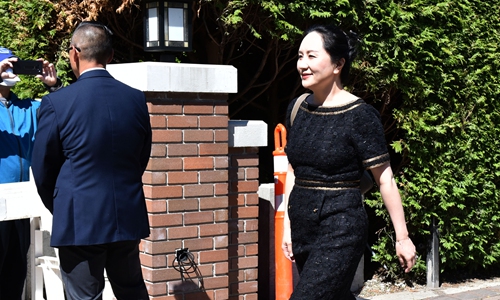Ruling on Meng 'won't alter Huawei's set strategy
By GT staff reporters Source:Global Times Published: 2020/5/28 19:33:40

Huawei Chief Financial Officer Meng Wanzhou leaves her Vancouver home on May 27, 2020 to appear in British Columbia Supreme Court. Photo: AFP
A court ruling in Canada over the fate of Huawei Chief Financial Officer Meng Wanzhou has again put the Chinese tech giant in the global spotlight. The ruling, though disappointing, won't alter the firm's set strategy toward the US supplies ban - from building backups and finding alternatives to quietly adjusting its management structure for long-term development.
More importantly, Huawei will never surrender to US bullying, Chinese observers said.
All these efforts, combined with technological strength it has built up over the years, and the broad public belief that Meng's being taken to custody is unjustified, will become a strong force for the tech giant to counter any challenges that lie ahead, they noted.
On Thursday, a Canadian judge ruled that the extradition case against Meng could proceed, as the case meets the Canadian extradition standard of so-called "double criminality," which also means an increased chance for Meng to be extradited to the US.
In a statement sent to the Global Times on Thursday, Huawei said it is disappointed in the ruling. "Huawei continues to stand with Meng in her pursuit for justice and freedom … Meng's lawyers will continue to work tirelessly to see justice is served," read the statement.
But the ruling may not have a major impact on the firm's existing strategy. "The ruling was expected, and Huawei has been making adjustments since Meng's arrest in December 2018," Ma Jihua, a veteran industry analyst, told the Global Times on Thursday.
The ruling will force Huawei to make firmer preparations for management succession. Meng, who's also the daughter of founder Ren Zhengfei, is seen by some as his potential successor, according to industry insiders.
Moreover, its business strategy will also continue to be one of development across multiple lines, instead of just focusing on the telecommunications sector. Huawei may make forays into new sectors, such as connected autos and smarter homes, to cash in, Ma said.
In a sign of continuing to press forward amid the US ban, Huawei's new product releases have shown no signs of delay during the past days. On Wednesday, Huawei released its 5G MatePad tablet.
In the first quarter of 2020, Huawei shipped about 1.5 million tablet PCs, up 4.3 percent year-on-year, taking a market share of 40.2 percent. That put it first domestically, ahead of Apple's 35.1 percent.
The company is also eyeing the intelligent security sector. It released the HoloSens SDC, the next-generation camera, on Monday, aiming to build what it called the "first brand in machine vision."
HoloSens is the Chinese tech giant's intelligent security brand based on its self-developed Kunpeng and Ascend chip series.
In response to the latest chip ban from the US, a Nikkei Asian Review report said on Thursday that Huawei has built up a two-year reserve of the "most important" US chips, laying the ground for future product releases.
"Intensified external pressure will only push the firm to be more united," Xiang Ligang, an industry analyst and a close follower of Huawei, told the Global Times.
In response to the court ruling, a senior executive of Huawei vowed to "work harder and harder, as there's never an easy way to achieve success."
"Justice may come late, but it will come," said another senior employee of Huawei.
Nevertheless, experts noted that though the firm's future is by no means bleak, it's set to be bumpy.
"The US crackdown on China's technology rise, starting with Huawei, will only become tougher until Washington plays all its cards and then realizes it will pay more than it could gain," Fang Xingdong, founder of Beijing-based technology think tank ChinaLabs, told the Global Times on Thursday.
Posted in: COMPANIES